|
De Franse schrijver André Gide werd geboren op 22 november 1869 in Parijs. Zie ook alle tags voor André Gide op dit blog.
Uit: Les Faux-monnayeurs
"Mais si cela voulait dire quelque chose, tu ne comprendrais tout de même pas.
Quand on parle, c'est pour se faire comprendre.
Veux-tu, nous allons jouer à faire des mots pour nous deux seulement les comprendre.
Tâche d'abord de bien parler français.
Ma maman, elle, parle le français, l'anglais, le romain, le russe, le turc, le polonais, l'italoscope, l'espagnol, le perruquoi et le xixitou.
Tout ceci dit très vite, dans une sorte de fureur lyrique.
Bronja se mit à rire.
Boris, pourquoi est-ce que tu me racontes tout le temps des choses qui ne sont pas vraies ?
Pourquoi est-ce que tu ne crois jamais ce que je te raconte ?
Je crois ce que tu me dis, quand c'est vrai.
(...)
Oui. Non ; écoute : on va prendre un bâton ; tu tiendras un bout et moi l'autre. Je vais fermer les yeux et je te promets de ne les rouvrir que quand nous serons arrivés là-bas.
Ils s'éloignèrent un peu ; et, tandis qu'ils descendaient les marches de la terrasse, j'entendis encore Boris :
Oui, non, pas ce bout-là. Attends que je l'essuie.
Pourquoi ?
J'y ai touché.”
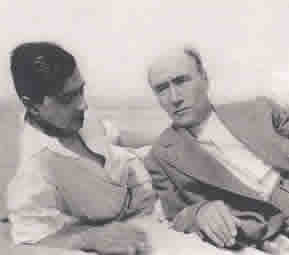
André Gide (22 november 1869 – 19 februari 1951)
Hier met zijn jonge geliefde Marc Allégret (links) in 1926
De Engelse dichteres en schrijfster George Eliot werd geboren op 22 november 1819 in Nuneaton in Warwickshire. Zie ook alle tags voor George Eliot op dit blog.
Uit: Silas Marner
“To them pain and mishap present a far wider range of possibilities than gladness and enjoyment: their imagination is almost barren of the images that feed desire and hope, but is all overgrown by recollections that are a perpetual pasture to fear. "Is there anything you can fancy that you would like to eat?" I once said to an old labouring man, who was in his last illness, and who had refused all the food his wife had offered him. "No," he answered, "I've never been used to nothing but common victual, and I can't eat that." Experience had bred no fancies in him that could raise the phantasm of appetite.
And Raveloe was a village where many of the old echoes lingered, undrowned by new voices. Not that it was one of those barren parishes lying on the outskirts of civilization--inhabited by meagre sheep and thinly-scattered shepherds: on the contrary, it lay in the rich central plain of what we are pleased to call Merry England, and held farms which, speaking from a spiritual point of view, paid highly-desirable tithes. But it was nestled in a snug well-wooded hollow, quite an hour's journey on horseback from any turnpike, where it was never reached by the vibrations of the coach-horn, or of public opinion. It was an important-looking village, with a fine old church and large churchyard in the heart of it, and two or three large brick-and-stone homesteads, with well-walled orchards and ornamental weathercocks, standing close upon the road, and lifting more imposing fronts than the rectory, which peeped from among the trees on the other side of the churchyard:--a village which showed at once the summits of its social life, and told the practised eye that there was no great park and manor-house in the vicinity, but that there were several chiefs in Raveloe who could farm badly quite at their ease, drawing enough money from their bad farming, in those war times, to live in a rollicking fashion, and keep a jolly Christmas, Whitsun, and Easter tide.”

George Eliot (22 november 1819 – 22 december 1880)
Cover
De Nederlandse schrijver Dirk van Weelden werd geboren in Zeist op 22 november 1957. Zie ook alle tags voor Dirk van Weelden op dit blog.
Uit: Verdwijnen en einde
“Het was niet moeilijk om ons met Rigaut te vereenzelvigen. Ook wij waren enigzins stuurloze jonge mannen die op het dode punt tussen jeugd en een eigen leven balanceerden. Ook wij hadden weinig fiducie in een normale maatschappelijke loopbaan en ook wij onderhielden een ambivalente relatie tot het idee dat we ons in de kunsten moesten ontplooien. Mede onder invloed van de penibele economische toestand en de sfeer van vervallen modernisme, politieke ongeloofwaardigheid en culturele verwarring, voelden ook wij het monster van het cynisme op onze zielen loeren. De nihilistische dada dandy die zo helder en intens over een spiegel, een lamp, een overhemd, een geeuw, de morele juistheid van het lege leven der rijken kon schrijven, dat was een aantrekkelijke verschijning. De uiterst consequente verbeelding van het ‘beginnersnihilisme’ dat aan de grote levenskeuzes vooraf gaat.
Waar we heel zelden en dan maar vluchtig over praatten met elkaar was Rigauts zelfmoord en de daarmee opgeroepen vraag naar de afstand die wijzelf tot die logische optie innamen. Bijna een half jaar zaten we bijna dagelijks gebogen over Rigauts teksten en vermaakten we ons met zijn overgevoelige ‘cool’, zijn laconieke fijnzinnigheid en die directe maar onthechte toon. Wat mij naast het proza hypnotiseerde was iets dat ik nu als huiver zou omschrijven. Er was ook iets griezeligs aan Rigaut. Iets confronterends. Zijn werk kwam voort uit een een overmatige reflexiviteit, een gekmakende bespionering van zichzelf en een genadeloze blik in de spiegel. Dat kwam mij maar al te bekend voor. Ook de ontdekking van het niets in de eigen ledematen en het eigen bewustzijn, herkende ik.
Het punt was dat Rigaut veel extremere conclusies uit die ervaringen trok dan ik. Hij zocht naar iets dat hem op waardige wijze kon helpen het illusoire karakter van kennis, liefde, schoonheid, rechtvaardigheid, wijsheid te overleven. Daarom noemde hij zichzelf een moreel personage en iemand die vooral probeerde niet te sterven. In zijn ogen was er niets dat hem van de weerzin kon genezen die hij voelde door een menselijk persoon te zijn, met een lichaam, een identiteit, een geschiedenis, een leven. Zelfs zijn zintuigen noemde hij onrechtmatig. Daarom restte hem niets anders dan ‘zijn eigen zeep te zijn’ oftewel zichzelf uit te wissen. Eigenlijk ging zijn logica nog verder. Hij schreef dat er helemaal niets mogelijks was, ook geen zelfmoord. Er school geen wijsheid, schoonheid of gelijk in de zelfgekozen dood.”
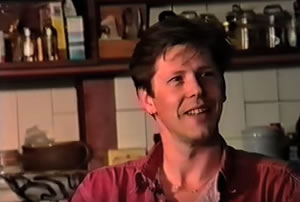
Dirk van Weelden (Zeist, 22 november 1957)
In 1992
De Duitse dichter, schrijver, acteur en regisseur Christian Filips werd geboren op 22 november 1981 in Osthofen. Zie ook alle tags voor Christian Filips op dit blog.
Exultate, jubilate!
Weg Libido! Weg, Bücher! Körper, weg!
Ihr wollt mir alle doch nur an die Leber.
Weg, Liebes-Hudelei! Lass keinen ran.
Und wenn Ihr mir mit Kränen auf den Leib rückt:
Geht besser nach Kamtschatka oder Leipzig,
Baut Euch im Umkreis Kolonien, benennt sie
Nach mir (So: Filips-Kongo. Oder: Christograd),
Errichtet Zoos, Gedächtnisorte, Nightclubs,
Schreibt Hausarbeiten zu meinen Gedichten,
Bringt mich ins Ungarische, pflegt mich, fleht nur –
Das alles lässt mich kalt. Ich, die Grandezza,
Bin schnellen Herzens, geh zu Bett um neun.
Verlier mich nicht im Denken, spekulier
auch jetzt nicht länger mehr auf Euren Anruf
- Ob jemand etwa grad bereit zu teilen
Mit mir sein bisschen Leben, Arbeit, Triebstruktur -
Ich leg mich einfach schlafen. Sage laut:
Legenden wachsen weiter. Bis sie wahr sind.
Der Teufel prahlte mit dem Glauben fauchend.
Ward zur Substanz. Und gab sich hin: dem Geist.
Heiße Fusion mit Aurora
Surplus, Surplus, reinster Überschuss.
Sperma von Giraffen. Rassenhunden.
Artischockenherzen. Liebe, unverlangt.
So viel, das uns umgibt. Mir träumte eben
leer und weiß vom Dung, vom Dunst von Schafen.
Inmitten der Herde, der heiligsten Wolken-Kommune
erschienst auch Du mir, wollte bei Dir schlafen,
aber im Fell meiner Beine warst Du bald nicht mehr zu sehen,
verschwunden aus Angst vor dem Schwanz, Dein extravagantes
tönendes Blöken, das mähte uns hin
alle die schöne Aurora-Kosmologie!
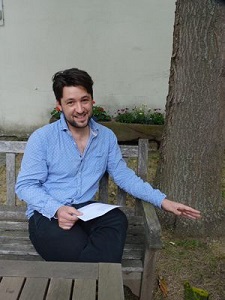
Christian Filips (Osthofen 22 november 1981)
De Brits-Indische schrijverstweeling Suresh en Jyoti Guptara werd geboren op 22 november 1988 in Frimley, Hants in het zuidoosten van Engeland. Zie ook alle tags voor Suresh en Jyoti Guptara op dit blog.
Uit: Conspiracy of Calaspia
'He heard the Ostentum have returned.' The voice was impossibly deep, and earthy, the very voice of the mountain, it appeared. It reverberated around the cavern, the bass vibrating inside the man's chest.
'Yes, Master.'
'Has he seen evidence?'
The man worded his response carefully, suppressing his confusion. Only the Master understood all aspects of the plan, even if they did seem self-contradictory to lesser beings. 'Not yet, Master.' 'Very well.'
The room was dark and damp, cave-like. In truth they were hundreds of feet above the ground. The figure looked out through a slit in the stone wall into blinding sunlight, although the room remained dark, as if the shadows here were resistant to being penetrated by the sun's rays. The Master turned to face him, and the man immediately hugged the ground.
The thundering voice spoke again. 'You have done well, Apostate. Arise.' Breathing a sigh of relief, the man, who looked so small, thin and pathetic in the shadow of his demonic master, stood. He quickly walked to a marble basin at the far end of the room and proceeded to wash. The Master did not move, but watched impassively as his servant cleaned off the signs of battle: grime, sand, blood Ð and even the wounds themselves.”
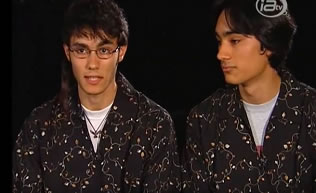
Suresh en Jyoti Guptara (Frimley, 22 november 1988)
De Russische schrijver Viktor Pelevin werd geboren op 22 november 1962 in Moskou. Zie ook alle tags voor Viktor Pelevin op dit blog.
Uit: Buddha's Little Finger (Vertaald door Andrew Bromfield)
`How are things in Petersburg?' asked Vorblei.
`As if you didn't know.'
`That's right,' agreed Vorblei, suddenly seeming to lose interest. `I do know.'
We turned off the boulevard, crossed the roadway and found ourselves in front of a seven-storey apartment house. It was directly opposite the Palace Hotel, in front of which two machine-gun installations were visible; they were manned by sailors smoking cigarettes, and a red flag flapped in the wind at the end of a long stick.
Vorblei tugged at my sleeve. `Look over there,' he said.
I turned my head. On the street outside the entrance to the house stood a black limousine with a tiny cabin for passengers and open front seats, on which the snow had piled up.
`What?' I asked.
`It's mine,' said Vorblei. `It goes with the job.'
`Ah,' I said, `congratulations.'
We entered the apartment building. The lift was not working and we had to make our way up a dark staircase, from which the carpet runner had not yet been ripped away.
`What is it that you do?' I asked.
`Oh,' said Vorblei, `it's not something I can explain in a few words. There's really a lot of work — too much, in fact. First one thing, then another, and then something else, and all the time you have to try to keep up. First one place, then another. Someone has to do it all.'
`In the cultural line, is it?'
He inclined his head to one side in a rather indefinite fashion. I did not try to ask any more questions.
When we reached the fifth floor we approached a tall door on which there was a clearly defined lighter coloured rectangular area which showed where a name plaque had once been. He opened the door, and we went into a dark hallway when a telephone on the wall immediately began to jangle."
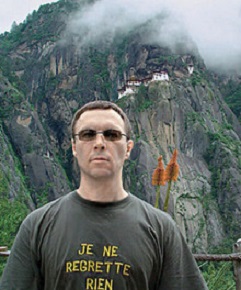
Viktor Pelevin (Moskou, 22 november 1962)
De Hongaarse dichter Endre Ady werd geboren op 22 november 1877 in het huidige Adyfalva. Zie ook alle tags voor Endre Ady op dit blog en ook mijn blog van 22 november 2010.
In Front Of Good Prince Silence
I walk the forest in the moonlight
Whistle through my chattery teeth
Stalking behind me ten feet tall
Good Prince Silence
Mercy, I tremble, dare not turn.
Mercy, I tremble, dare not turn,
And dare not gaze up, up to the moon:
One false movement, one needless sound
Good Prince Silence
Would step on me and tread me down.
Who Come From Far Away
We are the men who are always late,
we are the men who come from far away.
Our walk is always weary and sad,
we are the men who are always late.
We do not even know how to die in peace.
When the face of distant death appears,
our souls splash into a tam tam of flame.
We do not even know how to die in peace.
We are the men who are always late.
We are never on time with our success,
our dreams, our heaven, or our embrace.
We are the men who are always late.
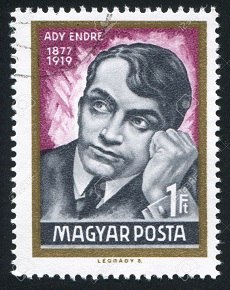
Endre Ady (22 november 1877 – 27 januari 1919)
Op een Hongaarse postzegel uit 1969
De Amerikaanse schrijver William Kotzwinkle werd geboren op 22 november 1943 in Scranton, Pennsylvania. Zie ook alle tags voor William Kotzwinkle op dit blog.
Uit: Swimmer in the Secret Sea
“The wave came again and carried them out onto the sea of pain, where he wondered again why life ever came into the world...The tide that drew them out into the troubled waters once again spent itself, and they floated slowly back, resting for a minute or so, only to be dragged out again. He held her up while she contracted and pushed inside herself, trying to open the petals of her flowering body...He lifted her, trying to free the load she was struggling with, but she was straining against the traces, getting nowhere, her eyes like those of a draft horse...Who would choose this, thought Laski, this work, this woe? Life enslaves us, makes us want children, gives us a thousand illusions about love, and all so that it can go forward.”
(…)
“Hardly had they rested when the waves carried them out again, like a nightmare that repeats itself over and over through the night, and over and over again through the years. Back and forth they went and he feared that her strength could not hold. He had no confidence, not in himself, nor in her. He felt like a helpless child, and Diane seemed helpless too, their long struggle getting them nowhere, only repeating itself--contraction, release, contraction again.”
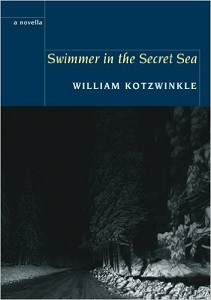
William Kotzwinkle (Scranton, 22 november 1943)
Cover
Zie voor nog meer schrijvers van de 22e november ook mijn blog van 22 november 2015 deel 2.
22-11-2016 om 18:37
geschreven door Romenu 
Tags:André Gide, George Eliot, Dirk van Weelden, Christian Filips, Suresh en Jyoti Guptara, Viktor Pelevin, Endre Ady, William Kotzwinkle, Romenu
|

